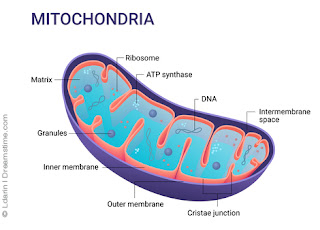MedScienceNews Review on CFS/ME (Chronic Fatigue Syndrome and Myalgic Encephalomyelitis One of the key underlying findings in conditions causing chronic mental or physical fatigue is dysfunction of the mitochondria. Mitochondria are small structures located in the nucleus of every cell, and every cell contains thousands of them. These powerhouses produce the energy our bodies need to carry out every function in the form of ATP (adenosine triphosphate). When mitochondria don’t function at their best, or too many of them are destroyed, our energy levels suffer. While this can be due to inherited genetic disorders, most often it is seen as the result of chronic damage over time. Many of the biochemical reactions in our bodies produce toxic versions of oxygen, hydrogen and nitrogen, including how we make ATP. These toxic molecules, which we call free radicals, have to be neutralized so they don’t damage the mitochondria. Our bodies have powerful antioxidant defenses to keep these in check. But when these protective systems become overwhelmed by too many free radicals, oxidative stress results and mitochondria are damaged. Each person’s ability to handle these toxins and oxidative stress is different and depends on the interaction between their genes and their environment. Our genes commonly have small errors, called SNPs (single nucleotide polymorphisms) that affect how each protein in our body works. [see: genetics vs genomics article] Since proteins run all of our biochemistry, these small DNA changes can affect how we deal with emotional stress, energetic stress, and physical stress; how we process the toxins; what we need nutritionally. When we get a mismatch of our genes and our diet and environment, that can set us on a collision course for disease if it persists over time. Some of the most common causes of oxidative include deficiencies of key nutrients and antioxidants (such as CoQ10, Alpha-lipoic acid, B vitamins, and Vitamin C), and overload of toxic substances in our environment (including air pollution, heavy metals like mercury and arsenic, herbicides and pesticides). Emotional stress is also often a key factor. Viral and other infections that trigger an immune response that then gets out of hand is also a common contributor. Chronic inflammation goes hand -in-hand with the oxidative stress, and this is why so many chronic diseases related to inflammation are also linked to mitochondrial dysfunction – either as a cause or as a result. Once this cascade of oxidative stress and inflammation gets going, it feeds itself and can be hard to reverse unless all contributing factors are addressed. Because mitochondria are found in every cell of the body, often multiple systems are affected. This can result in a wide range of symptoms that are often hard to diagnose, especially in conventional medicine. Fortunately, we have ways to understand what each person needs through personalized approaches. By integrating functional medicine, genomics, and a wide range of healing modalities, we have the knowledge and the tools to unlock what each person needs to restore health – and then keep them healthy. |
SPOTLIGHT SERIES:
Climbing Out of CFS with Alternative Therapy
SHOT DOWN BY CFS
In 2017, Suzanne Wheeler was diagnosed with Myalgic Encephalitis or Chronic Fatigue Syndrome. She was home bound for about two years and bed bound about 50% of the time. Suffering from significant chronic pain throughout her body with a health report reading equivalent to that of about a 95 year old, Suzanne spent the better part of 15 years being mis-prescribed therapeutic drugs and dangerous opioids that gave little or no positive results. Read Suzanne's exploratory journey to wellness, her extensive research and her ultimate solution to getting back on her feet again with PEMF.








No comments:
Post a Comment